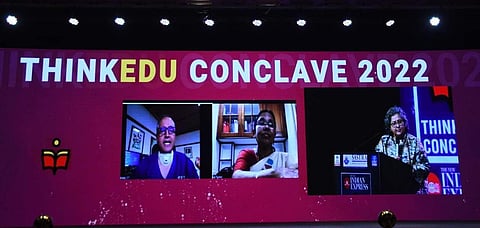

India is in dire shortage of doctors and nurses — a longstanding issue that was exacerbated by the COVID-19 pandemic, stated KK Shailaja, former Health Minister of Kerala, in a conversation with Dr Devi Shetty, Chairman of Narayana Health, on the second day of the 10th ThinkEdu Conclave.
"Although the public health system in Kerala is strong, the doctor-to-patient and the nurse-to-patient ratio are still insufficient. The norm is that for every 1000 people, there should be one doctor, but in India, there is one doctor for 1511 patients, even going by the registration data, and there should be one nurse for 300 patients but there is one nurse for 670 patients," said Shailaja who has been credited as being instrumental in Kerala's fight against COVID-19. She was speaking on the topic 'The Right Prescription: Why We Need More Doctors'.
"This is already insufficient during normal situations, but with a pandemic, it becomes so much more difficult to tackle. We were also short of nurses during that time (COVID-19 pandemic). We will not be able to suddenly appoint so many of them during the pandemic or during natural calamities," she said.
When she took over as Kerala's Health Minister in 2016, she pointed out the shortage and the Kerala Government created 7,000 posts. However, it was still insufficient, she said. "India needs 10 lakh more doctors to meet the world average," she added. Shailaja also said that the government's expenditure on health should be drastically improved in order to bring about any real change.
Devi Shetty was in agreement that there is an acute shortage of doctors and nurses in the country. "Nobody knows how many doctors are actually practicing in India. There are no figures available for this. If we want to plan how many more doctors we might need, we have to know how many doctors are currently practicing," he stated. He added that even with a shortage in nurses, the government does not allow new nursing colleges to come up.
With around 18,000 medical college students having returned from war-hit Ukraine, Shetty said that these students can be accommodated in Indian medical colleges. "You distribute 100 of these students in each medical college. The campus we have in medical colleges for preclinicals can easily manage up to 500-600 students. For clinicals, you can't send the 100 students to existing medical college hospitals because they are already crowded, so these colleges should affiliate with a 250-300 bedded district or taluk government hospital and then upgrade them," Shetty said.
ThinkEdu 2022 is the grand tenth edition of what has consistently been India's biggest education conclave for a decade now. March 8 and 9 will see some stalwarts of India's academic, economic and political ecosystems bring ideas, ideologies and reflections on the past, present and future of India's education system. The sessions will be viewed by a live audience, in addition to the 2,750 registered users on the conclave's digital space. Over the last nine years, the conclave has seen some true stalwart thinkers such as former presidents Dr APJ Abdul Kalam and Dr Pranab Mukherjee, MPs Jairam Ramesh, Smriti Irani, former CM of Jammu and Kashmir Farooq Abdullah, NITI Aayog's CEO, Amitabh Kant and spiritual guide Sadhguru.
